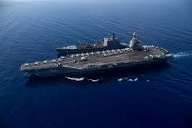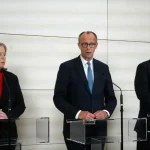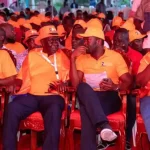The global power rivalry has intensified after Russia and China openly backed Venezuela, following President Nicolás Maduro’s accusation that the United States was “provoking war” by deploying the world’s largest aircraft carrier close to Latin America.
The growing standoff is fueling fears of a new Cold War–style confrontation, with major world powers taking opposing sides in a dispute that could redefine the geopolitical balance in the Western Hemisphere.
Moscow: “US Is Escalating Global Instability”
The Russian Ministry of Foreign Affairs on Friday condemned Washington’s move to deploy the USS Gerald R. Ford, describing it as a “reckless act of intimidation.”
“The United States continues to escalate global instability under the guise of maintaining security,” said Russian Foreign Ministry spokesperson Maria Zakharova. “This deployment near Venezuela is a direct provocation designed to assert dominance over independent nations.”
Russia warned that it would stand with Venezuela “in defending its sovereignty” and accused Washington of militarizing regions that should remain zones of peace.
The Kremlin also hinted at plans to strengthen military-technical cooperation with Venezuela, including the possibility of joint naval exercises in the Caribbean — a move analysts say could further heighten global tensions.
Beijing: “Peaceful Dialogue, Not Military Provocation”
China echoed Moscow’s sentiments, urging the United States to “pursue dialogue instead of intimidation.”
In a statement from Beijing, the Chinese Foreign Ministry said the U.S. deployment threatens to destabilize Latin America, a region already facing economic and political challenges.
“The world does not need another display of military muscle,” said Chinese Foreign Ministry spokesperson Lin Jian. “China stands for peaceful coexistence, respect for sovereignty, and non-interference in internal affairs.”
Beijing reaffirmed its commitment to Venezuela’s development through economic partnerships and infrastructure projects, positioning itself as a counterweight to U.S. influence in the region.
Washington Defends Move as ‘Routine Mission’
The Pentagon has dismissed claims of aggression, insisting the warship’s deployment is part of a routine security operation aimed at combating drug trafficking and ensuring freedom of navigation in international waters.
“This is not an act of aggression,” said Pentagon spokesperson Laura Smith. “The deployment of the USS Gerald R. Ford is consistent with international law and long-standing maritime missions.”
Despite these assurances, observers believe the timing and location of the operation are symbolic — signaling that Washington intends to reaffirm its dominance in the Americas amid growing Russian and Chinese presence.
Analysts Warn of a New Power Contest
International relations experts say the situation could evolve into a major geopolitical flashpoint if diplomacy fails.
“What we are seeing is a microcosm of the global power contest between the United States, Russia, and China,” said political analyst Dr. Lucia Fernandez, a professor of international affairs in Madrid. “Each side is testing the other’s influence in regions once considered politically stable.”
She added that Latin America, long viewed as the U.S.’s strategic backyard, has now become a battleground for influence between global powers seeking new allies and access to vital natural resources.
Maduro Thanks Allies for Support
President Maduro has expressed gratitude to both Russia and China, calling their support “a shield of solidarity” in the face of what he described as “U.S. imperial aggression.”
“Venezuela is not alone,” Maduro said in a televised address. “The free nations of the world are standing with us against the arrogance of empire. We will continue to defend peace and sovereignty.”
The Venezuelan leader also emphasized that his country remains committed to peaceful diplomacy, but warned that any act of provocation would be met with “a firm and proportionate response.”
Latin America Caught in the Crossfire
Several Latin American governments have expressed concern about the escalating tension. Countries like Brazil, Argentina, and Mexico have called for de-escalation and dialogue, warning that a regional arms race could have catastrophic economic and humanitarian consequences.
The Organization of American States (OAS) has urged all parties to “exercise maximum restraint,” emphasizing the need to prioritize peace and cooperation.
However, regional divisions remain deep, with countries like Cuba and Nicaragua openly supporting Maduro’s government, while others remain aligned with Washington’s policies.
Global Implications
Experts believe the confrontation over Venezuela could have far-reaching implications for global trade, oil markets, and international diplomacy.
“This is no longer a regional issue,” said Dr. Ahmed Rashid, a security analyst in Dubai. “It’s about who controls strategic sea routes, who sets the rules of engagement, and who influences emerging economies in Latin America.”
With Venezuela holding some of the world’s largest oil reserves, the political alignment of its government has significant implications for global energy security and the balance of power.
A World on Edge
As the rhetoric intensifies, the situation underscores the deep divisions in global politics.
While the U.S. insists its actions are defensive, critics argue that Washington’s expanding military presence near Venezuela is a calculated move to counter the growing influence of Russia and China in the Western Hemisphere.
Meanwhile, Venezuelans remain anxious as their country becomes the latest stage for great power competition, with the risk of confrontation threatening to destabilize an already fragile region.
“Latin America Divided as US, Russia, and China Clash over Venezuela Tensions”
It would strengthen your site’s political and global coverage section, drawing readers searching for “Latin America politics” and “US foreign policy.”










